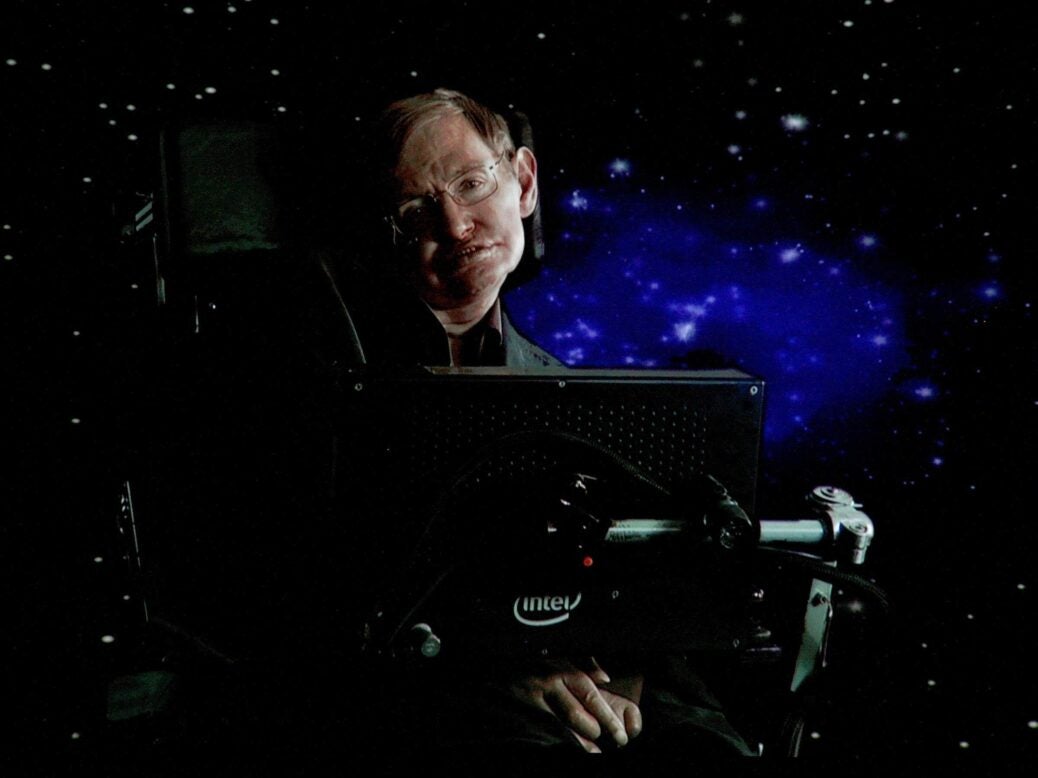
Stephen Hawking was no ordinary star, but a giant one, whose legacy will inspire millions more scientific minds, writes Rasika Sittamparam
Having defied the expectations of medical science for more than three decades, Professor Stephen Hawking died today at his home in Cambridge on — of all days — the anniversary of Albert Einstein’s 139th birthday.
It was in 1985 that doctors suggested taking him off life support, only to be stopped by his then wife Jane Hawking. That humanity owes her a great deal cannot be doubted, arguably even more than the man himself, who with the help of his voice generator, artfully said: ‘Time is relative.’
What’s more remarkable than Hawking’s survival in the face of the debilitating motor neurone disease that he was diagnosed with at 21, is that he became one of the greatest cosmologists of all time. He’s most famous for something even Einstein couldn’t do: unifying the two previously antagonistic pillars of twentieth century physics — the classical general relativity and the once ridiculed quantum theory — as well as updating our understanding of black holes. The seismic impact of this achievement, which came to worldwide attention in the 1970s, was felt in cosmological proportions and has changed the understanding of life at its most fundamental level since. This was in addition to the myriad theories, scientific papers, books including A Brief History of Time which reigned over the Sunday Times best seller list for a record breaking 237 weeks, accolades and lectures that followed.
Hawking was the man who told the story of what happened before the Big Bang, some 14 billion years ago.
As such he was not only a star, but a giant star whose death has resulted in a supernova — a titanic explosion that will create even more stars from debris floating in space. In the same way that the explosion of a star is now believed to have created our own solar system, his long and unusual life work and story will surely inspire and create the next generation of scientists, thinkers and humans like him.
But could there be another Hawking lurking around space time already? For believers of the multiverse theory, which posits that there are an infinite number of parallel universes in existence, it’s possible that there may be many, many Hawkings out there, developing cosmological ideas in different dimensions. But for those who take hope in developments rather closer to home, then they could look to Hawking’s philanthropic legacy — one that’s on a mission to create more brilliant minds, regardless of disability. As a man who made his millions from his bestselling books, Hawking channelled his wealth through the foundation that bears his name into scholarships in cosmology, astrophysics and particle physics at school and university level. Beyond nurturing future thinkers, Hawking also funded the quest to find the cure for the disease which killed him — amyotrophic lateral sclerosis — whose sufferers have an average of 15 months to live after diagnosis.
Having lived against the odds both in terms of life and work, Hawking is understandably regarded as one of the greatest Britons of all time, one whose academic legacy will one day eclipse even those of Newton and stand shoulder to shoulder with Einstein. These achievements aside, he was also one of the most quoted figures in modern history. ‘We are just an advanced breed of monkeys on a minor planet of a very average star,’ said Hawking. ‘But we can understand the Universe. That makes us something very special.’ Just like him.
Rasika Sittamparam is a science & tech writer at Spear’s
Related
Meet CRISPR: the genetic route to perfection
How AI could transform wealth management






